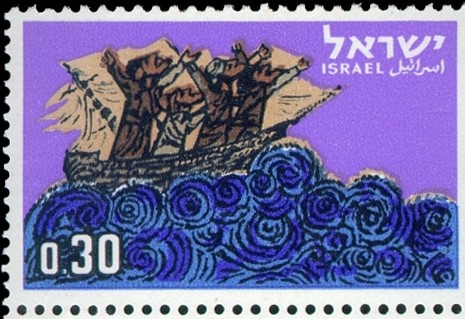Above: Israeli Stamp of Jonah
Image in the Public Domain
++++++++++++++++++++++++++++++++++++++++++++++++++++++++
READING JONAH
PART I
++++++++++++++++++++++++++++++++++++++++++++++++++++++++
Jonah 1:1-17 (Protestant and Anglican)
Jonah 1:1-2:1 (Jewish, Roman Catholic, and Eastern Orthodox)
++++++++++++++++++++++++++++++++++++++++++++++++++++++++
Where can I go then from your Spirit?
where can I flee from your presence?
If I climb up to heaven, you are there;
if I make the grave my bed, you are there also.
–Psalm 139:6-7, The Book of Common Prayer (1979)
++++++++++++++++++++++++++++++++++++++++++++++++++++++++
The Book of Jonah is a theologically rich work of pious fiction. Other works within that category in the Old Testament include Esther, Daniel, Tobit, and Judith. The story of Jonah, written after the Babylonian Exile, contradicts the combined witness of ancient historical sources and much of the Hebrew Bible. That is fine. It is not a problem if one reads the Book of Jonah for what it is.
Shall we begin, O reader?
Nineveh was the capital of the Neo-Assyrian Empire. Empires rose and fell in Mesopotamia and beyond. The Neo-Assyrian Empire was notoriously violent. The Neo-Assyrian Empire absorbed the Kingdom of Aram in 732 B.C.E. and the Kingdom of Israel in 722 B.C.E.. Then the Neo-Assyrian Empire menaced the Kingdom of Judah and reduced it to vassalage. Finally, the Chaldean/Neo-Babylonian Empire conquered the Neo-Assyrian Empire in 609 B.C.E.
The story of Jonah played out before the fall of Samaria. The titular character was a subject of the Kingdom of Israel. His name comes from that of a prophet (2 Kings 14:25) who prophesied during the reign (788-747 B.C.E.) of King Jeroboam II of Israel.
Jonah received and immediately rejected the call of God. He went not to Nineveh but in the opposite direction–to the coastline of the Mediterranean Sea. He paid his fare for a journey to Tarshish, perhaps in Asia Minor or Spain. During a severe storm, Jonah’s faithlessness became obvious. The pagan sailors had more faith in YHWH than Jonah did. Jonah probably hoped for death; it would spare him having to go to Nineveh.
God had other plans, though.
The author, writing in the Persian Period, knew well that Nineveh lay in ruins. He also had a relatively generous attitude toward many Gentiles. Persian kings sponsored the building of the Second Temple and the rebuilding of Jerusalem’s walls. King Cyrus II of the Persians and the Medes had conquered the Chaldean/Neo-Babylonian Empire and permitted Jewish exiles to return to their ancestral homeland.
Another theme present in these verses is the balance of divine judgment and mercy. Repentance can avert judgment, or delay it, at least. We tend to approve of divine mercy on ourselves and on those similar to us, do we not? And do we not also prefer divine judgment on those we find objectionable. Perhaps they are objectionable. They are also human beings who bear the image of God. They need to repent as much as we do.
I have learned much about the churched and the unchurched via conversations. I have learned that the minds of many of the unchurched are more open to deep theological discussions than those of many of the churched. I have chosen a denomination (The Episcopal Church) renowned for its embrace of questions. I have, however, long known that many other denominations have cultures hostile to questions. Some of their members have told me to my face and via email that I will go to Hell because I ask too many questions and think too much. I did not make the mistake afterward of mistaking them for people who ask a sufficient number of questions and think enough. I have also found that many of the unchurched, often refugees from churches, are often open to engaging in serious theological discussions.
The point that the pagan sailors had more faith in YHWH than Jonah did resonates with me, therefore. To borrow a theme from the New Testament, especially the Gospel of Mark, those who think they are insiders may actually be outsiders, and visa versa.
KENNETH RANDOLPH TAYLOR
NOVEMBER 9, 2020 COMMON ERA
THE FEAST OF MARTIN CHEMNITZ, GERMAN LUTHERAN THEOLOGIAN, AND “SECOND MARTIN”
THE FEAST OF JOHANN(ES) MATTHAUS MEYFART, GERMAN LUTHERAN EDUCATOR AND DEVOTIONAL WRITER
THE FEAST OF MARGERY KEMPE, ENGLISH ROMAN CATHOLIC MYSTIC AND PILGRIM
THE FEAST OF WILLIAM CROSWELL, EPISCOPAL PRIEST AND HYMN WRITER
++++++++++++++++++++++++++++++++++++++++++++++++++++++++


Leave a comment